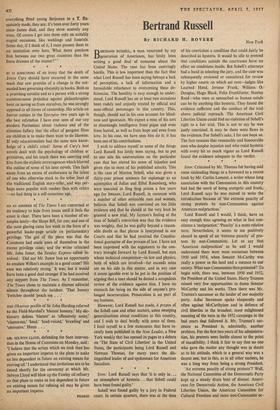IT IS SOMETHING of an irony that the death of
Joyce Cary should have occurred in the same week that saw promise of a change in the out- moded laws governing obscenity in books. Both as a practising novelist and as a person with a strong common-sense prejudice against philanthropists bent on saving us from ourselves, he was strongly opposed to all forms of censorship. His article on horror comics in the Spectator two years ago is the best refutation I have ever seen of our coy modern Puritanism about violence and of the common fallacy that the effect of gangster films on children is to make them want to do likewise. If only educationalists had the same sure know- ledge of a child's mind! Some of Cary's best novels dealt with the psychology of children or primitives, and his touch there was unerring and free from the stylistic extravagances which blurred the outline of some of his later novels. This fault came from an excess of exuberance in the talent of one who otherwise stuck to the sober lines of the traditional English story-teller, and was per- haps more popular with readers than with critics —no bad thing in a self-conscious age.












































 Previous page
Previous page